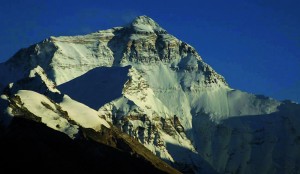WEDNESDAY, 15 MAY 2013
At the foot of the highest mountain in the world, surrounded by rocks and ice, lies one of the most hostile environments on the planet. Here, the air is too thin for helicopters to approach; one wreckage lies sprawled against the craggy ground. Breathing is the perpetually oppressive imperative, and hypoxia drains the body’s capacity to carry out trivial physical tasks. Performance on basic mental functions, like remembering a list of 15 words or joining numbered dots, is embarrassingly impaired. Even sleeping can become arduous.Most trekkers to Everest base camp are thrill- seekers, but Dr Andrew Murray and the Caudwell Xtreme Everest team have other purposes in mind. They are driven by the pressing need to improve care for the critically ill. In the UK, one in five of us will end up in intensive care, where the mortality rate is 40 per cent. Despite this being one of the most sophisticated areas of modern medicine, “we really don’t understand why it is that some people die and some people survive”, Dr Murray explains. “But the one thing that almost all of these patients have got in common is low oxygen levels. Equally, we don’t know why some people perform well at altitude and others get awful crippling mountain sickness.”
So, for a period of three and a half months in 2007, the team set up a lab at 5364 metres, performing tests on 208 volunteers in the hope that studying the genetic and physiological factors behind the human body’s response to hypoxia will allow the development of better treatments. I asked Dr Murray about some of the difficulties faced when trying to do science in such an environment: “Absolutely everything has to be trekked in on a yak or with a porter...” What would otherwise be minor details become major logistical problems; all lab equipment is subject to testing in an environmental chamber first as even laptop hard drives won’t work (solid state equivalents are used instead).
That’s not to mention the challenges faced by members of the team. “We’re testing in an environment where we hope we’re going to have really profound changes on physiology, but then we’ve got to operate as researchers and try to ignore the fact that we’re very, very short on oxygen.” A long day in the lab is even longer at altitude: “...it doesn’t really help when you’re trying to think straight at the end [of the day], so you’ve just got to try and acclimatise as best you can”. Several researchers went one step further, ascending to the summit to experiment on themselves. Blood oxygen was measured at the highest ever altitude (found to be the lowest ever value for a ‘healthy’ subject), and muscle biopsies were endured.
Dr Murray says: “it wasn’t just a scientific opportunity, although I did obviously still believe in that, it was an opportunity to go to a part of the world I’d read about since I was a child and always wanted to visit”. He tells of evenings and weekends during his postdoc spent working on the project, focussed not on how this would get him papers, grants and jobs, but driven purely by a desire to get out there and do something exciting. “People asked me ‘why are you wasting your time getting involved in this project?’ but the simple reason was: I wanted to do it.”
So, what does Xtreme Everest 2 hold in store? “What’s going to be really rewarding is that, unlike our previous expedition where we were just looking at lowlanders, this time we’re also looking at Sherpas.” This native people of the Nepali Himalayas are “the supreme altitude performers”; their genetic distinctions are well studied but nobody knows what functional differences make them such successful highlanders. “There is something clearly remarkable about their physiology; you’ll be carrying a very light day pack, walking up a moderate slope, and you’ll be out of breath, and the natives, you’ll see them stroll past you, carrying huge weights, wearing a pair of flip flops.” To discover what they find, follow the progress of the expedition (starting 1st March) at http://www.xtreme-everest.co.uk.
Elly Smith is a 2nd year undergraduate studying Biological Natural Sciences at Trinity Hall

